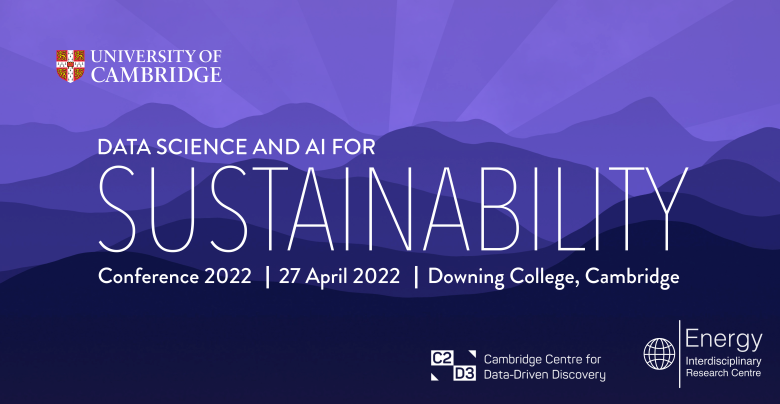On Wednesday 27th April 2022, C2D3 and Energy IRC jointly hosted the a Data science and AI for sustainability conference.
As we move towards a zero carbon economy to meet climate change targets, it is critical to identify and tackle data and AI challenges associated with the generation, storage and supply of energy.
This is increasingly important from a technology, policy and societal perspective. New technologies for energy networks, smart grids, future cities and future energy trading will require new ways of joined-up thinking about complex data sets, better policy frameworks and government regulation.
This conference brought together academics, industrialists and policymakers to share their research, identify new opportunities and discuss areas where further collaborative work is required to decarbonise the energy sector.
Summary Report from the Conference
Read about the day's discussions and learning points in the summary report provided below.
Watch on demand
C2D3 members can access the on demand recording via the Member Resources page here.
Programme
Opening
Professor Colm-Cille Caulfield (Head of the Department of Applied Mathematics and Theoretical Physics (DAMTP), University of Cambridge)
Policy and regulation
What behavioural changes are required and how do we ensure that we create an energy system which is equitable and affordable? What are the policy instruments, frameworks and incentives needed to accelerate decarbonisation and scaling up renewable energy? What are the opportunities for the transition to low carbon generation? How do we prepare the grid and transmission system for future challenges?
Chaired by Dr Anil Madhavapeddy (Department of Computer Science and Technology, University of Cambridge)
- Julian Critchlow (Senior Advisor Bain & Company; former DG Energy Transformation & Clean Growth, BEIS)
- Dr Ronita Bardhan (Department of Architecture, University of Cambridge)
- Lucy Yu (CEO, Octopus Energy’s Centre for Net Zero)
Rapporteur: Arden Berlinger, Postgraduate Student, Department of Plant Sciences
Technologies: energy networks
What are the key challenges, innovations and opportunities for the UK electricity network? How do we adapt and enhance existing networks? How do we create new efficient and effective ones? How do we integrate networks to optimise performance?
Chaired by Dr Teng Long (Department of Engineering, University of Cambridge)
- Dr Fei Teng (Department of Electrical and Electronic Engineering, Imperial College)
- Iulian Nitescu (Co-Founder and CTO, Graphmasters)
- Dr Ioannis Lestas (Department of Engineering, University of Cambridge)
Economics: energy market trading
How is data science and AI changing the energy market organisation and design? What are the factors affecting pricing? How do we ensure market stability and minimise cost? How do we embed market resilience and avoid future shocks?
Chaired by Professor Michael Pollitt (Judge Business School, University of Cambridge)
- Dr Ramit Debnath (Judge Business School, University of Cambridge)
- Ciaran Flynn (Head of Modelling & Analysis, Sembcorp Industries Ltd)
- Steven Steer (Lead Data Consultant, Zuhlke)
Future cities: buildings
How can we use AI to synchronise buildings energy supply and demand? How can we optimise building management systems? How can data visualisation help run buildings efficiently? How do we adjust building occupancy behaviour by combining technology with social data?
Chaired by Professor Ajith Parlikad (Institute for Manufacturing, University of Cambridge)
- Ellissa Verseput (Data Team Lead, Sympower)
- Dr Jim Scott (Chief Production Officer, Grid Edge)
- Dr Jethro Akroyd (Department of Chemical Engineering and Biotechnology, University of Cambridge)
- Dr Isabella Gaetani (Senior Scientist Smart Buildings, Arup)
Closing
Professor Colm-Cille Caulfield (Head of the Department of Applied Mathematics and Theoretical Physics (DAMTP), University of Cambridge)
Conference Artist in Residence
Our Conference Artist is Residence, Diana Scarborough (Multimedia Artist, website http://www.dianascarborough.co.uk), produced a video snapshot of the key themes that emerged during the day. “I saw it as a proactive RETHINKING of our energy future, identifying problems and proposing ideas and solutions through innovation informed by research, experiences and knowledge of their sectors. My 'take away' this is made complicated by the human, cultural and economic factors and the need for a people-centric approach informed by location and situation.”
Multimedia Artist, Diana Scarborough, conference video snapshot.
Organising Committee
C2D3: Ellen Ashmore, Almarie Williams; Energy: Shafiq Ahmed, Raheela Rehman, Lata Sahonta.
Funding
We thank the follow for their support:
- Isaac Newton Trust
- NERC Discipline Hopping Grant
- Cambridge University Press and Asssessment

 Cambridge Centre for
Cambridge Centre for